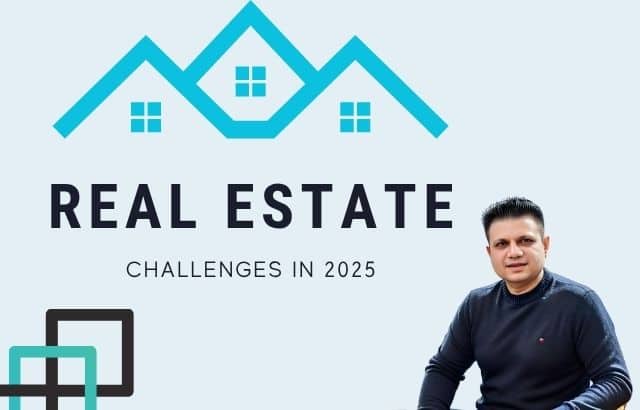Real estate has always been a dynamic and ever-evolving industry, with new opportunities emerging as quickly as new challenges. As we step into 2025, real estate continues to be one of the most impactful sectors globally, driving economic growth, urban development, and personal wealth. However, just like any industry, it is not without its hurdles. According to Hirav Shah, India’s most trusted real estate astrologer and strategist, real estate problems can significantly impact businesses. He emphasizes the importance of strategic planning, timing, and even astrology to navigate these complex issues successfully.
In this blog, we will explore the most significant real estate issues currently shaping the industry in 2025, along with expert insights on how professionals and investors can address these challenges effectively.
Table of Contents
1. Housing Affordability Crisis
Housing affordability remains one of the biggest challenges in 2025, with the gap between income levels and rising property prices growing wider. According to a recent study, property prices in major urban centers have increased by 10-15% in the last two years, while income growth has stagnated. This price surge is putting homeownership out of reach for a large portion of the population, particularly first-time buyers and lower-income families.
Example: In cities like Mumbai, Bengaluru, and Delhi, the price of a mid-range 2BHK apartment has risen by over 12% in 2023-2024 alone. As a result, investors are turning towards secondary markets and suburban locations for better ROI and affordable housing options.
Solution: Developers and agents need to innovate by offering more affordable housing models such as micro-apartments, shared ownership, or rent-to-own schemes. Additionally, focusing on affordable housing in emerging areas with future growth potential could present investment opportunities.
2. Inventory Shortages
Inventory shortages continue to plague the real estate market, especially in high-demand metropolitan areas. As construction costs rise and land availability becomes more scarce, many markets face a supply-demand imbalance, which drives up prices.
Example: In top cities like Bengaluru, Chennai, and Pune, the residential supply has been lagging behind demand for several years. In some cases, inventory is down by 25-30%, pushing buyers to compete aggressively for properties.
Solution: Builders and agents must focus on expediting construction processes, exploring underutilized plots, and increasing collaboration with government bodies to streamline approvals and zoning regulations.
3. Rising Interest Rates
The rising interest rates, which began in 2023 as a response to global inflationary pressures, have had a significant impact on the affordability of mortgage loans. Higher interest rates mean that monthly repayments for homebuyers have increased, which can deter potential buyers and reduce overall demand in the housing market.
Example: According to the Reserve Bank of India (RBI), home loan interest rates in India have risen by up to 2% in the last 12 months, significantly affecting new buyers’ purchasing power.
Solution: Real estate agents and investors must explore financing options like fixed-rate mortgages, or work with lenders who offer attractive, tailored loan products to help mitigate the burden of higher interest rates on potential buyers.
4. Economic Uncertainty
Global economic instability, driven by factors such as geopolitical tensions, inflation, and potential recessions, has made both buyers and investors more cautious in their real estate decisions. The risk of economic downturns is causing hesitation, especially when making long-term investments.
Example: The COVID-19 pandemic in 2020 demonstrated how quickly an economic crisis could disrupt the real estate market, with many markets experiencing severe dips in demand.
Solution: Investors must diversify their portfolios by considering not only residential but also commercial, industrial, and even real estate in international markets that may offer more stable returns.
5. Technological Disruption
Technology is transforming the way the real estate industry operates, from AI-powered analytics to virtual reality property tours, blockchain for transactions, and automated property management systems. These innovations improve efficiency but also require constant adaptation and learning.
Example: AI tools are now being used to predict property trends, allowing investors to make more data-driven decisions. Real estate agents are increasingly using virtual tours to show properties remotely to clients across the globe.
Solution: To stay competitive, real estate professionals need to keep up with tech advancements. Integrating AI, blockchain, and other smart technologies into business operations can give them an edge in a tech-driven market.
6. Environmental Sustainability
The demand for sustainable, eco-friendly homes is on the rise, driven by increasing awareness of climate change and a growing commitment to sustainability. From energy-efficient homes to properties designed with renewable energy sources, buyers are increasingly seeking green features.
Example: Developers in metro cities like Mumbai are now incorporating green building certifications, like LEED, into their projects. Energy-efficient homes can command a 5-10% premium in price, according to recent industry reports.
Solution: Developers must incorporate green technologies and energy-efficient solutions into their projects to meet demand and gain a competitive advantage.
7. Regulatory Changes
Constant changes in property laws, tax reforms, and government regulations continue to pose challenges for real estate professionals. Navigating new tax laws, GST regulations, and RERA compliance can be time-consuming and complex.
Example: The introduction of RERA (Real Estate Regulatory Authority) has added a layer of complexity for developers and agents. Ensuring transparency and compliance is now mandatory, which may increase operational costs for many businesses.
Solution: Real estate professionals should keep themselves updated with the latest regulatory changes to avoid penalties and stay ahead of competitors. Collaborating with legal experts and consultants can also help streamline the compliance process.
8. Demographic Shifts
The real estate industry is being reshaped by demographic shifts, including the aging population, the rise of millennials as homebuyers, and increasing migration patterns within countries.
Example: Millennials now make up a significant portion of first-time homebuyers in India. According to a report by NAR (National Association of Realtors), nearly 40% of homebuyers in 2024 were millennials aged between 25-40.
Solution: Developers and agents must cater to the changing needs of different demographics, such as providing more affordable starter homes for millennials or senior living communities for aging populations.
9. Urbanization vs. Suburbanization
Urbanization trends are slowing down in some parts of the world, while suburban areas are experiencing rapid growth, largely due to the rise of remote work and improved transportation infrastructure.
Example: In cities like Delhi and Mumbai, there has been a notable shift of people moving from crowded urban areas to quieter suburban locales. Suburban real estate prices have risen by 20% in some regions over the last year.
Solution: Real estate professionals should track migration trends and invest in properties in suburban or emerging locations that have the potential for long-term growth.
10. Pandemic-Related Impacts
While the COVID-19 pandemic is no longer at the forefront of people’s minds, its long-term impact on real estate trends remains evident. The shift to remote work and the increasing need for adaptable spaces continue to influence both residential and commercial real estate.
Example: The demand for larger homes with home offices has soared since 2020. Real estate agents have reported a 30% increase in demand for homes with extra bedrooms and office spaces.
Solution: Investors should focus on properties that meet the new lifestyle demands, such as larger homes or properties in less densely populated areas that offer greater flexibility for remote work.
Frequently Asked Questions (FAQs)
1. How can I mitigate the risks of rising interest rates in the current real estate market?
- To combat rising interest rates, consider opting for fixed-rate mortgages, refinancing options, or exploring innovative financing solutions. Additionally, focusing on properties in growing regions can help ensure long-term value despite short-term borrowing costs.
2. Is it a good time to invest in real estate amid economic uncertainty?
- While economic uncertainty can lead to volatility, real estate has traditionally been a stable long-term investment. Diversifying your portfolio and focusing on properties with high demand, such as affordable housing or eco-friendly homes, can help weather economic downturns.
3. How do I adapt to the growing demand for green buildings?
- Developers should incorporate sustainable features such as energy-efficient appliances, solar panels, and green building certifications to meet demand. Staying updated with environmental regulations will help position your property as eco-friendly.
From the Desk of Hirav Shah
The real estate industry is evolving, shaped by various factors such as affordability, economic uncertainty, technological advancements, and changing demographic patterns. To stay competitive, professionals must be proactive in addressing these challenges while adopting new strategies and technologies. As Hirav Shah advises, it’s not just about having the right timing and strategy—it’s also about understanding the forces at play and adapting with precision. Success in real estate requires not only a deep understanding of the market but also a keen sense of timing, strategic planning, and sometimes even astrology to make the right decisions.
The real estate market in 2025 is filled with both challenges and opportunities. Rising prices, inventory shortages, and fluctuating interest rates are top concerns. However, by staying ahead of trends—like affordable housing, tech integration, and sustainable properties—you can unlock significant returns. Remember, timing, strategy, and understanding market dynamics are key. With the right approach, success is inevitable.
Let’s make this year your best yet!
Warm regards,
Hirav Shah
Real Estate Strategist & Investment Advisor





















